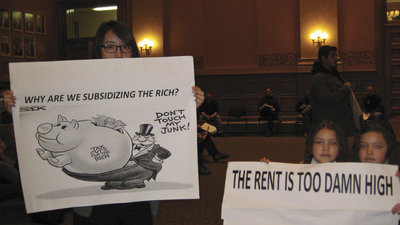During a heated debate regarding a controversial 30-year tax deal for a three-tower residential development planned for Journal Square, resident after resident told the City Council they supported the project and were eager to see new construction go up in the long-overlooked neighborhood once known as the heart of Jersey City.
The residents were less enthusiastic about the length and terms of the tax abatement deal the city was about to approve for the KRE Group, the developer for the project.
The development, known alternately as Journal Squared and J2, has become something of a symbol, although it represents different things to different people.
For Journal Square residents who have seen the city’s downtown communities revitalized as the waterfront was redeveloped over the last 20 years, J2 represents the hope that their neighborhood will be similarly reshaped and resuscitated.
For construction workers, many of whom attended the Nov. 13 council meeting to support the project, J2 represents the promise of more jobs in an industry that is still struggling to recover from the recession and housing slump.
For the administration of Mayor Steven Fulop, Journal Squared represents the beginning of a new tax abatement strategy designed to spur development in parts of the city where little or no construction has taken place.
But for many other residents, the project represents a bum deal for the city that only benefits the developer at the expense of property owners who do not get tax breaks from the city.
‘I’m tired of the developers pitting the residents and taxpayers against the workers, because we’re all struggling.’ – Cynthia Hadjiyannis
____________
Questioning abatements
“What does it do to the equilibrium of the tax base to hand out these long-term tax abatements?” asked downtown resident Fletcher Gensamer, a former city council candidate who said he has seen his own property taxes increase by 37 or 38 percent in less than a decade.
Despite opposition from dozens of residents, a divided City Council approved the abatement for the KRE Group.
Council members Frank Gajewski, Khemraj “Chico” Ramchal, Richard Boggiano – who represents the Journal Square neighborhood – Diane Coleman, Daniel Rivera, and Rolando Lavarro Jr. all voted in favor of the abatement deal.
Ward D Councilman Michael Yun voted against it, agreeing with residents that long-term abatements create two classes of taxpayers.
At-large Councilwoman Joyce Watterman abstained from voting on the tax deal, explaining that she ran for office, with Fulop, on the promise of creating more affordable housing that would be evenly distributed throughout the city. Since the J2 project does not include any affordable housing, Watterman said she could not support the tax deal.
Under the tax deal, KRE will make a $2.8 million contribution to the city’s Affordable Housing Trust Fund, but will not build any affordable housing units in its three-tower, 1,840-unit development.
Councilwoman Candice Osborne did not attend the Nov. 13 meeting and did not participate in the vote.
“I’m tired of the developers pitting the residents and taxpayers against the workers, because we’re all struggling,” said Cynthia Hadjiyannis, a real estate attorney who is part of the newly founded Jersey City Tax Abatement Action Committee. “We’re getting ripped off by this deal. The only people profiting from this deal is the developer.”
KRE will pay about $1,300 in taxes per residential unit, on average, Hadjiyannis noted, while other nearby condos pay far more. At Canco Lofts on Dey Street, for example, the per unit annual tax is about $4,000, on average, Hadjiyannis said.
Lack of school funding comes as a surprise
Most members of the council agreed with Jersey City resident and realtor Jeff Kaplowitz, who said, “You walk outside at Journal Square at eight o’clock at night and there is nothing there. There is nothing going on. This is not prime real estate, [despite the presence of the PATH train]. I cannot do a deal in Journal Square. We need this project.”
Kaplowitz pointed out that early investors in an untested neighborhood will always get the best tax deal.
A vote on the abatement was nearly postponed when it came to light that KRE will not be contributing any money to the Jersey City Public Schools. While developers generally do not make contributions to the local school system under most tax abatement deals, Fulop had vowed to include payments for education in tax abatements advanced by his administration.
Under the tax abatement deal offered to the KRE Group, Corporation Counsel Jeremy Farrell explained that the developer will be making a $2.5 million contribution to the Landmark Loew’s Jersey Theatre instead of making a contribution to the schools.
“This is news to me. This was not my understanding,” said Council President Lavarro, who made a motion to table the vote on the abatement so that this matter could be discusses further.
The motion failed.
Lavarro later voted in favor of the abatement, which clears the way for the developer to break ground on the first phase of the project next month. But Lavarro said he planned to talk to Mayor Fulop about the matter of school funding from abated properties further.
“This is a big concern for me,” said Lavarro, a Fulop ally who campaigned on the mayor’s slate in the May municipal election.
E-mail E. Assata Wright at awright@hudsonreporter.com.
